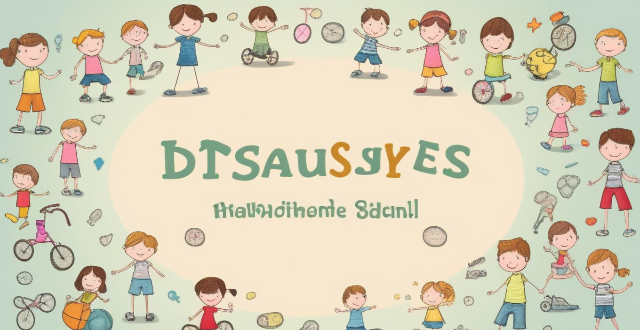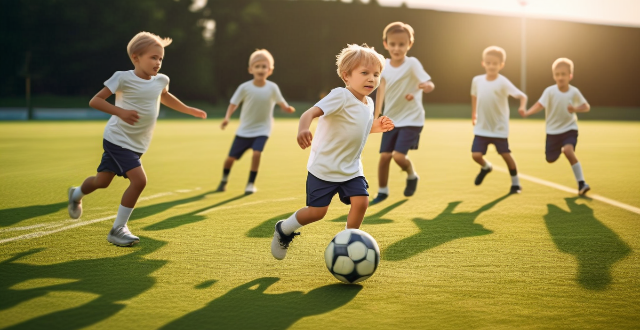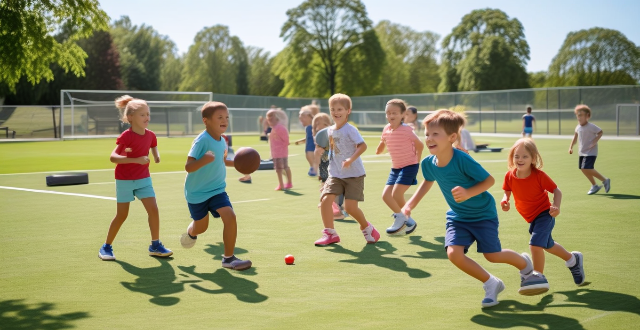Life Children

What role do sports play in character building for children ?
The article discusses the various ways in which sports contribute to the overall personality development of children. Sports ensure physical health and well-being, teach valuable life skills such as teamwork, leadership, communication, and goal setting, impact emotional development by boosting self-esteem, teaching resilience, and handling pressure, provide opportunities for socialization, and play a crucial role in moral development by instilling values such as integrity, respect, and responsibility. The author concludes that sports are not just about physical fitness but are powerful tools for character building in children.

How do celebrities approach parenting and family life ?
Celebrities face unique challenges in balancing work and family life, providing a normal upbringing for their children, maintaining privacy, and teaching responsibility and values. They prioritize family time, involve their children in work, set boundaries, encourage independence, limit media exposure, focus on education, hire security personnel, use private spaces, keep personal lives offline, lead by example, discuss consequences, and volunteer together. These strategies help them navigate the complexities of raising children in the public eye while providing a loving and supportive environment.

How do I provide for minor children in my estate plan ?
When it comes to estate planning, one of the most important considerations is how to provide for your minor children. Here are some steps you can take to ensure that your children are taken care of financially and emotionally after you're gone: Create a will or trust, name a guardian, establish a trust fund, consider life insurance, and make sure your beneficiaries are up-to-date.

How can parents encourage their children to develop new skills through interactive activities ?
The article provides strategies for parents to encourage their children's skill development through interactive activities. It emphasizes the importance of hands-on, engaging learning experiences and offers specific tips for creating a supportive environment, involving children in planning, modeling behavior, offering praise, making learning fun, allowing for trial and error, providing practice opportunities, connecting learning to real life, and being patient and persistent. The goal is to help children become well-rounded individuals who are motivated and equipped for future challenges.

How can parents effectively teach their children about safety ?
Teaching children about safety is crucial for their well-being. Parents can effectively teach their children about safety by establishing clear rules, educating them about potential dangers, practicing safety drills, encouraging open communication, and modeling safe behavior. By doing so, children will develop awareness and the ability to protect themselves from potential dangers.

How can children be encouraged to speak up if they feel unsafe ?
The article emphasizes the importance of creating a safe and supportive environment for children to express themselves without fear of judgment or criticism. It suggests educating children about personal safety, role-playing different scenarios, and discussing potential consequences of not speaking up if they feel unsafe. The article also recommends teaching children who to trust, encouraging them to use their voice, and providing options for seeking help. Overall, it highlights the significance of empowering children to take action and advocate for their own safety.

It explains why children are not interested in literacy and how to correctly guide children to literacy

How can parents balance work and home teaching strategies for their children ?
Parenting in the modern era is a challenging task, especially when it comes to balancing work responsibilities with home teaching strategies for children. Here are some tips: - Set priorities by identifying what is most important and allocating time accordingly. - Create a routine that provides structure and predictability for both parents and children. - Utilize technology as a tool for supplementing learning outside of traditional school hours. - Involve children in household chores to teach them valuable life skills while also freeing up more time for parents. - Seek support from others such as grandparents, babysitters, or other family members who are willing to lend a hand.

What are the benefits of participating in team sports for children ?
Participating in team sports for children offers benefits including improved physical health, psychological well-being, social skills development, life skills acquisition, and educational advantages. These activities enhance cardiovascular health, self-esteem, teamwork, discipline, and academic performance. Overall, team sports provide a comprehensive developmental experience that prepares children for success in various life aspects.

How does preschool education prepare children for kindergarten and beyond ?
Preschool education is crucial in preparing children for kindergarten and beyond. It helps them develop essential skills such as socialization, language development, cognitive development, emotional development, fine motor skills, and gross motor skills. These skills are crucial for success in kindergarten and beyond, where children will be expected to work and play with others, read, write, and communicate effectively, navigate complex social situations, form healthy relationships, and participate in physical activities. By attending preschool, children gain a strong foundation for future learning and success in all areas of life.

How can parents implement successful home teaching strategies for their children ?
This article discusses successful home teaching strategies that parents can implement for their children. The key strategies include creating a conducive learning environment, setting clear goals and expectations, encouraging active learning, using positive reinforcement, fostering open communication, and modeling good study habits. These strategies aim to support children's academic growth and help them develop essential life skills.

How does exercise influence social skills in children ?
Exercise plays a crucial role in shaping children's social skills by enhancing communication, empathy, emotional intelligence, resilience, problem-solving abilities, healthy risk-taking, and leadership skills. Physical activity helps children build self-confidence, promotes teamwork, develops empathy, enhances emotional intelligence, increases resilience, enhances problem-solving abilities, encourages healthy risk-taking, and fosters leadership skills. These skills are essential for establishing positive relationships with peers and contributing to their communities. Therefore, it is imperative to encourage children to engage in regular exercise to support their overall development and success in life.

What are some effective ways to teach children about climate change ?
Teaching children about climate change is crucial for their future and the planet's well-being. Here are some effective ways to educate them on this important topic: 1. Use age-appropriate language that they can understand, avoiding complex scientific terms. 2. Incorporate interactive learning through games or experiments that demonstrate the effects of climate change. 3. Discuss real-life examples of climate change, such as extreme weather events like hurricanes, floods, and droughts. 4. Encourage critical thinking by asking open-ended questions about climate change and encouraging problem-solving skills. 5. Involve children in solutions by participating in community clean-up events, planting trees, or reducing energy consumption at home. 6. Integrate technology through educational apps, videos, and websites that provide engaging and informative content on climate change. 7. Foster empathy for nature by encouraging children to spend time outdoors and appreciate the beauty of the natural world. By using these effective methods, we can help children understand the importance of protecting our planet and inspire them to take action against climate change.

In what ways do sports help with emotional regulation in children ?
Engaging in sports can significantly aid children in developing emotional regulation skills by promoting stress reduction, enhancing self-esteem, developing resilience, encouraging teamwork and social interaction, teaching discipline and self-control, providing an outlet for energy, and promoting mindfulness.

What are the best practices for teaching children about money management and savings ?
Teaching children about money management and savings is an essential life skill that can help them develop good financial habits. Here are some best practices for teaching children about money management: 1. Start early: Even toddlers can understand basic concepts like saving and spending. Use everyday opportunities to talk about money and its value. 2. Lead by example: Children learn by example, so it's important to model good financial habits yourself. Show them how you budget, save, and make decisions about spending. 3. Use allowances wisely: Giving your child an allowance is a great way to teach them about money management. Encourage saving, teach spending, and introduce giving as part of their allowance. 4. Play money games: Board games and online games can be fun and educational at the same time. Some popular ones include Monopoly, The Game of Life, and PiggyBot. 5. Involve them in family finances: Involving your children in family finances can help them understand the real-world implications of money management. Have them help you create a budget, go grocery shopping with you, and talk to them about bills and expenses. Remember to be patient, consistent, and positive when teaching children about money management and savings. With these best practices, your child will develop good financial habits that will serve them well throughout their life.

How can parents promote healthy developmental milestones in their children ?
This article provides tips for parents on how to promote healthy developmental milestones in their children, including providing a stimulating environment, encouraging social interaction and physical activity, teaching self-care skills, and fostering independence.

What are the benefits of teaching children about climate change ?
Teaching children about climate change is crucial for their future, empowering them to take action and make a difference. It enhances their awareness, critical thinking skills, environmental stewardship, innovation, preparation for future careers, empathy, responsibility, healthy habits, resilience, and interest in science and technology. This education can lead to informed decision-making, problem-solving abilities, responsible behavior towards the environment, and a sense of global citizenship. By teaching children about climate change, we are preparing them to confront one of the most significant challenges facing our planet.

What are the potential risks associated with children specializing in one sport too early ?
Specializing in a single sport at an early age can have both advantages and disadvantages for children. While it may lead to improved skill development and potential for higher-level competition, there are also several potential risks associated with this approach. These include physical risks such as overuse injuries, burnout, and lack of cross-training benefits; psychological risks like pressure and stress, narrowed social experiences, and fear of failure; developmental risks including delayed skill development, loss of childhood, and reduced adaptability; social risks such as isolation, peer pressure, and limited life skills; and academic risks such as time management challenges and prioritization issues. To mitigate these risks, experts often recommend encouraging diverse participation in sports until late adolescence, ensuring a balanced approach between sports, school, and leisure time, providing access to mental health resources for athletes dealing with stress and pressure, and involving parents in a supportive but not pushy way.

How do family-friendly events help in building a strong relationship between parents and children ?
Family-friendly events play a crucial role in fostering strong relationships between parents and children. These events provide opportunities for families to spend quality time together, engage in fun activities, and create lasting memories. In this article, we will discuss how family-friendly events can help build a strong relationship between parents and children. One of the primary benefits of family-friendly events is that they enhance communication between parents and children. During these events, families have the chance to talk about their interests, share experiences, and learn new things together. This open communication helps to build trust and understanding within the family unit. Family-friendly events offer a structured environment where parents and children can spend quality time together without distractions. This dedicated time allows families to reconnect and strengthen their bonds. Family-friendly events often feature a variety of activities that cater to different age groups and interests. This exposure to new experiences can help children develop new skills and hobbies, while also allowing parents to discover hidden talents or interests within themselves. The memories created during family-friendly events are invaluable in building strong relationships between parents and children. These experiences become cherished moments that families look back on fondly, reinforcing the importance of spending time together. Family-friendly events also offer opportunities for parents and children to develop empathy and understanding towards one another. By observing each other's reactions and emotions during these events, families can gain insights into each other's perspectives and feelings.

What role does life insurance play in estate planning ?
Life insurance is a crucial tool in estate planning, offering solutions for liquidity needs, tax considerations, charitable giving, business succession, income replacement, and wealth preservation. It helps beneficiaries gain immediate access to cash, manage estate taxes, support philanthropic goals, facilitate business transitions, replace lost income, and transfer wealth efficiently. Life insurance policies can be tailored to fit individual needs, making them a versatile component of any comprehensive estate plan.